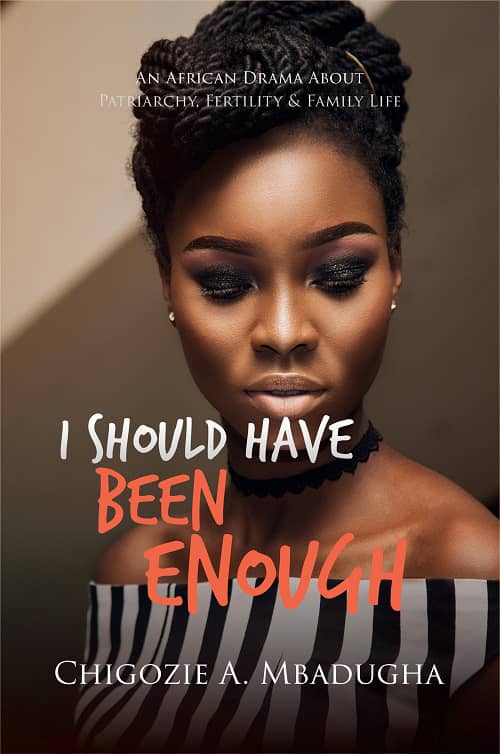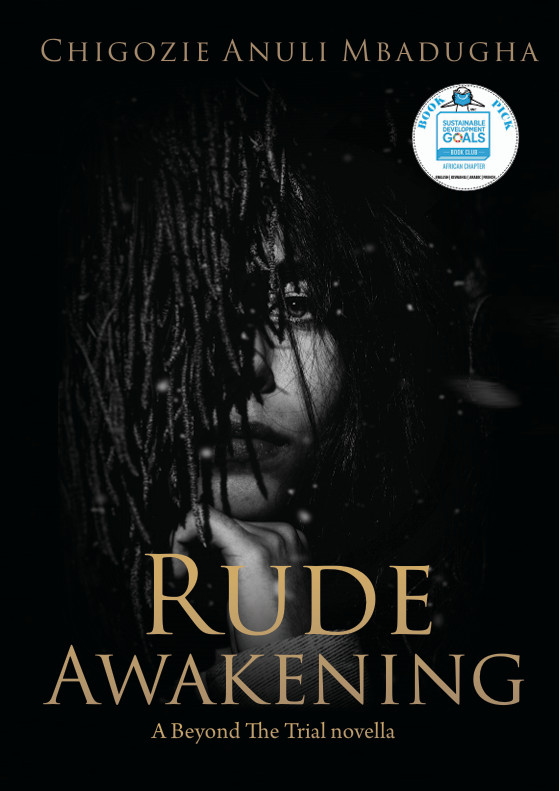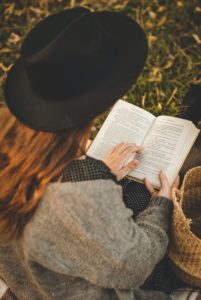In a world where stories hold the power to ignite change, Chigozie Mbadugha stands as a beacon of courage and advocacy through her powerful narratives. Her novella, Rude Awakening, and drama, I Should Have Been Enough, emerge from a deep well of personal and societal struggles, shedding light on entrenched gender inequalities and the silent battles faced by women in Southeast Nigeria. With a blend of profound empathy and unwavering resolve, Chigozie uses her writing to confront the harsh realities of gender discrimination, inheritance injustices, and the stigmatization of women. Her work is not just a reflection of her own experiences but a clarion call for awareness and reform, inspiring others to challenge the status quo and champion the cause of gender equality.
- What inspired you to write your novella “Rude Awakening” and your drama “I Should Have Been Enough”?
I wrote “Rude Awakening” because I was irked by the skewed female inheritance pattern in Southeast Nigeria in which custom prevents female children from inheriting property from their parents because they have been defined as a gender that must marry and leave their paternal homeland and therefore should be excluded. Even though the Supreme Court of Nigeria has corrected this anomaly through a landmark ruling, this practice is still entrenched in most Igbo societies today. I wrote “Rude Awakening” to create awareness and change the narrative. The maltreatment of widows is another theme I explored in “Rude Awakening.” In some families, when a man dies without writing a will (Africans have an aversion to planning for death and inheritance), the family swoops in and tries to dispossess the wife of property that she possibly worked hard to purchase jointly with her husband. These practices need to stop.
Nigerian and Africa are largely patriarchal societies and women are often blamed for what is not their fault, and they are expected to keep quiet and endure. “I Should Have Been Enough” was inspired by the stories of women whose marriages failed because there was male factor infertility and they chose to remain faithful to their vows and not seek pregnancy outside of their marriages. I wanted to remind people that there are many options available to childless couples such as adoption and fertility treatments. Marriage is for companionship mostly and their mutual love should be enough.
- Can you share your personal journey and experiences that led you to focus on gender discrimination and gender equality in your writing?
My journey has been pleasant, but I have interacted with too many women, in the course of my job as a doctor, who have experienced varying degrees of gender discrimination. I also have female relations who have been victims. The characters in my stories urge me to write on and I am shocked when women, who I did not know went through these experiences, reach out to me and say I was writing about them and that they felt a connection to the stories and that they are glad I spoke up for them.
- What challenges did you face in writing about such sensitive and critical issues within the context of South East Nigeria?
I remember attending a national literary conference in Nigeria some years ago. We were discussing “Rude Awakening.” A man stood up and said he was tired of hearing about gender issues in Nigeria. He wanted to know if I was ‘one of those feminists’ and if I was married. I told him that the stories I write about are not necessarily written because of feminism. They are stories of maltreatment and discrimination of a gender that MUST be told because a lot of times the actual victims have lost their voice and need someone else to tell their stories for them. I have chosen to be that voice. If the stories I am inspired to write take me in those directions, I am happy to go there. And yes, I am happily married to a lovely man who supports me greatly.
- How has writing about gender issues impacted your own understanding and perspective on these topics?
I find that because I am an African woman and I have written about these topics, a lot of women read my books and share their own stories with me. It has helped me understand better the challenges faced by women in deciding to walk away from dysfunctional relationships and starting afresh. I understand their fears of being isolated and abhorred by the community as ‘that woman who could not keep her home,’ and the strange fact that the failure of that marriage will be attributed to them only, even though there were two parties in the union. My perspective is that as a society we must look out for women and let them know they are welcome to return home if the marriage does not work out, and that there will always be support for them. Too many African women have stayed in violent marriages and paid for it with their lives. The perpetrators go unpunished most of the time and remarry quickly, sometimes within months after the death of their spouses. We can no longer allow this to keep happening. For every woman who is being physically abused, there are possibly four more who are experiencing verbal or psychological abuse and are not captured because there are no obvious physical wounds to bandage. The wounds in their hearts are deeper and take longer to heal and the infliction of these wounds must stop.
- What role has mental health played in your creative process, and how do you manage it while dealing with the intense subject matter of your work?
I try not to be weighed down by the seriousness of the themes I explore. It is easy to slip into depression or to get bitter when handling intense subject matters like these. I write these intense emotional stories without being downcast for long because I am writing them like an ‘innocent bystander’ and because I feel drawn to write about the challenges faced by my African ‘sisters’. Keeping these emotions inside is unhealthy. Pouring them out on paper is cathartic and therapeutic for me.
- Can you describe any significant moments or feedback you’ve received about your books that have affected you deeply?
Some colleagues and patients who have read my books identified with them. They looked me in the eye and thanked me for sharing their stories even though I did not know they had had similar experiences. Those were surreal moments for me and they encouraged me to keep writing.

- How do you address the potential backlash or criticism that comes with tackling gender discrimination and societal issues in your writing?
I simply ignore backlash or criticism and walk away. Everyone knows at least one woman who has at one time or another faced what I write about. It is too common and we cannot continue to pretend these things are not happening. As Martin Luther King said ‘Evil persists when good men do nothing.’ I will not keep quiet.
- What strategies do you use to ensure that your voice remains authentic and impactful in your work?
I try to write from my heart and not copy the way other amazing African authors write. We can write about the same theme and our stories will be different, and indeed, they should be different because our voices, perspectives, and styles are unique. I just try to be me. I don’t want people to read my books and start looking for dictionaries to look up words too often. I write simply so that everyone can understand my message.
- What has been the impact of having your book “Rude Awakening” selected by the UN SDG Book Club on your writing career?
The selection of “Rude Awakening” by the UN SDG Book Club boosted my confidence and writing career greatly. I felt fulfilled and encouraged that my voice was being heard. I sold more copies of my books and I was invited to more speaker events to discuss my work. My book ‘Beyond the Trial’ which contains the novella ‘Rude Awakening’ was selected to be printed by CANON at the largest worldwide tradeshow for the Graphic Arts and Commercial Printing Industry (DRUPA) from May 28 – June 7, 2024 in Dusseldorf, Germany. That was a lovely recognition I received because “Rude Awakening” was selected by the UN SDG Book Club.
- How do you balance the emotional weight of writing about women’s struggles with your own well-being?
I encourage myself by acknowledging that I am contributing to changing the narrative by writing about these topics. I am confident that with concerted efforts by human rights groups engaged in gender discrimination issues and political will, these struggles will be won.
- What advice would you give to women writers who want to address social issues in their work but are concerned about potential criticism or challenges?
They should not be afraid of the backlash and challenges. One can never please everybody and the law is there to protect us. They are serving a universal goal by speaking up and the more they write courageously, they will inspire other authors to write too. There can never be too many voices.

12. How do you think storytelling can influence and drive change in societal attitudes towards gender equality?
Storytelling can influence and drive change in societal attitudes towards gender equality by challenging existing stereotypes by presenting diverse and complex characters. When people see narratives that break away from traditional gender roles, it can shift their perceptions and expectations. Through storytelling, individuals can experience the world from different perspectives. This can foster empathy and understanding and make it easier for people to relate to and support gender equality. Stories can bring attention to the inequities and challenges faced by different genders, raise awareness and inspire action to address them. Positive representation of strong, diverse characters in stories can provide role models for all genders. Over time, the accumulation of diverse and inclusive stories can lead to broader cultural shifts and reshape societal norms and values towards greater gender equality.
- What are your future goals for your writing and advocacy work in the realm of gender issues?
My future goals for writing and advocacy in the realm of gender issues include highlighting and supporting the stories and perspectives of individuals who have experienced gender inequality, and advocating for legal and policy reforms that protect and empower African women. Building and nurturing communities where people can share their experiences, find support, and collaborate on advocacy efforts is a goal that I have. Collaboration can help reach a wider audience and bring about more significant change so I intend to partner with organizations, activists, and influencers to amplify the impact of advocacy efforts.
14. Can you share any personal stories of women whose experiences have inspired or influenced your writing
My late cousin, Chidinma, lost her husband after about five years of marriage. His family packed her belongings out of the room she shared with her husband and bid her farewell. For her, it signalled a rejection of her and her child. She felt like an outcast and it broke her heart because she longed for a relationship between her daughter and her husband’s family. That incident was a ‘Rude Awakening’ for her. I wonder if she would have been treated differently if her child had been male. Her experience and those of millions of African women inspire my writing.
- How do you envision the current narrative around gender roles and discrimination evolving, and what role do you hope to play in that evolution?
The narrative around gender roles and discrimination in Africa is evolving rapidly, influenced by increased awareness, activism, and shifts in societal norms. The portrayal of gender inequality in stories and media is improving, helping to shape public perceptions and fostering change and equity. There have been significant strides in legal protections and rights for gender-based discrimination and violence in Nigeria. These changes are essential for ensuring equality and combating discrimination. I aim to support this evolution by continuing to write stories that promote gender equality, raising awareness, and promoting understanding and social justice.






